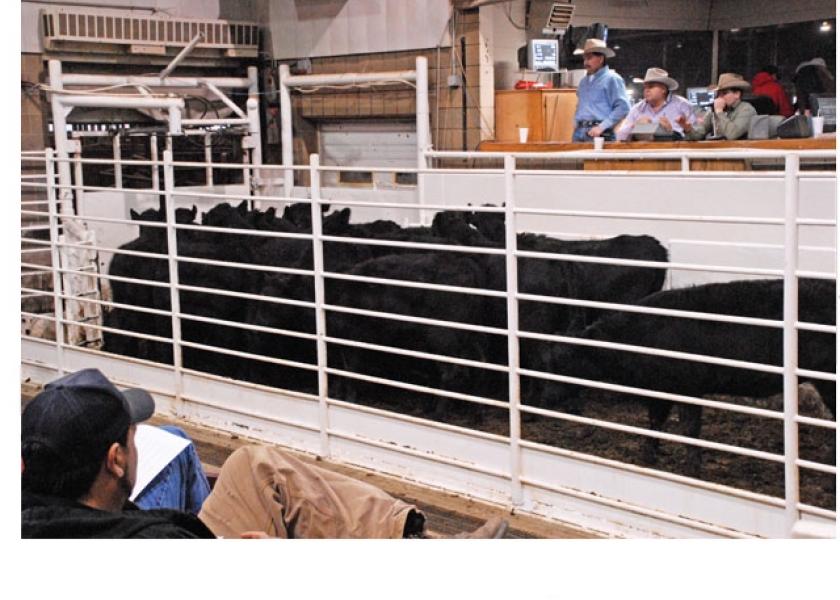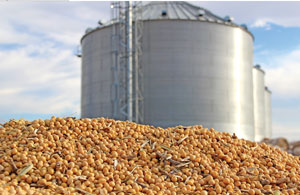Checkoff Change: Bypassing States?

New proposal is big on complexity, short on clarity when it comes to redirecting funds
As clear as mud? A proposed federal rule change attempts to define the potential path of checkoff dollars, but it might add a layer of confusion for beef and soybean producers.
The July proposal by USDA’s Agriculture Marketing Service (No. AMS-LPS-13-0083 if you want to look it up) is heavy on technicality and light on clarity, despite its nine pages of text. Still, it could kick up dust over beef and soybean assessment dollars.
In both cases, producers are required to pay a portion of their earnings ($1 per head, per sale of cattle or
0.5% of soybean sales) to their respective checkoff programs. In each case, half of those assessments fund the producer’s state checkoff program; the other half goes to the national board.
Under the banner of “redirection,” the AMS proposal allows beef and soybean producers in certain states to request their assessment dollars be channeled away from state organizations and go straight to national checkoff boards. Essentially, at a producer’s request, Qualified State Beef Councils and Qualified State Soybean Boards would be bypassed, with checkoff assessments funneling directly to the Cattlemen’s Beef Board (CBB) or United Soybean Board (USB).
The proposed AMS rule is a restoration of language included in the Beef Order (1985) and Soybean Order (1991) but accidently removed in 1995, according to the agency. “AMS inadvertently removed parts of the Code of Federal Regulations from each Order as it related to producer credits or refunds regarding referendums,” explains AMS on its website.
Angie Snyder, associate deputy administrator of the AMS Livestock, Poultry and Seed Program, says the proposal attempts to correct an oversight. “During an initiative to pull out unnecessary or obsolete regulations in the 1990s, we removed defunct refund provisions,” she says. “However, we also removed language that covered redirection, though it was phrased differently. Provisions would be added back in to both orders allowing producers, if not prohibited by state law, to request their assessments paid to a state council or board be redirected to the national program.”
The technical nature of the proposed rule is necessary due to the complexity of two orders, two laws, two boards and multiple state statutes, Snyder says. “We know it’s complicated and tried to boil down the proposed rule into simple form. We posted FAQs on our website to address any questions producers might have,” she adds.
Polly Ruhland, CEO of CBB, says the proposal is intended to clarify a producer’s prerogative to direct money to the organization of choice, within the confines of state and federal law. “The language was inadvertently removed,” she says. “The rule proposal doesn’t contain the original language but is more extensive for clarity’s sake.”
Harrison Pittman, director of the National Agricultural Law Center, believes the AMS proposal wording makes it virtually impossible to discern to whom, how and when the rule, as proposed, would apply.
Pittman points to two important pitfalls in the AMS proposed rule. One, state soybean boards and beef councils could lose significant funding. Two, there might be an issue as to whether the state producer-refund provisions are preempted or superseded by federal law.
|
“It is commonly asserted that state refund provisions are preempted or superseded by the federal soybean and beef laws,” Pittman says. “If that’s true, then those state provisions have no legal effect.
Yet, the AMS proposal estimates 10 out of 569,998 soybean farmers and 20 out of 915,000 beef producers will seek redirection. Basically, the new rule proposal resurrects language that lay dormant for 21 years in order to accommodate a projection that 30 U.S. producers will seek redirection, according to AMS.
In the background of the AMS proposal hovers a lawsuit in Montana federal district court filed by R-CALF against USDA. R-CALF’s legal action attacks the constitutionality of the beef checkoff program by claiming the federal assessment, half of which is staying with the Montana Beef Council, is forcing R-CALF to subsidize speech at a private council. (See Ranchers-Cattlemen Action Legal Fund, United Stockgrowers of America v. U.S. Agriculture Secretary Tom Vilsack.)
R-CALF’s suit essentially states no policies exist allowing R-CALF to direct the full assessment to CBB and away from the Montana Beef Council (MBC). R-CALF alleges the transfer of money to MBC is unconstitutionally compelled speech.
R-CALF filed the complaint on May 2, 2016. Six weeks later, on July 15, AMS reintroduced the wording removed more than two decades earlier. On Aug. 4, USDA filed a motion to dismiss the R-CALF complaint, saying USDA’s long-standing policy allows for redirected payments.
“From a legal standpoint, USDA seeks dismissal of the R-CALF complaint by focusing primarily on the impact of the so-called redirection rule, and not otherwise addressing free speech issues,” Pittman describes.
Bill Bullard, R-CALF CEO, says the proposal came in response to R-CALF’s lawsuit, and the soybean provision was added to provide cover. “This proposed rule was hastily prepared and put on the fast track, all due to our case.”
“I have been reading and commenting on proposed USDA rules for 15 years. I’ve disagreed with many proposed rules, but USDA has been a competent and formidable participant,” Bullard says. “However, this rule is the exception. It is sloppy, convoluted and terribly confusing.”
As for AMS’ projection that 20 beef producers will seek redirection? Bullard claims half of R-CALF’s 4,000 members will request redirection.
“USDA is trying not to acknowledge it’s unconstitutional for checkoff dollars to be funneled to a private entity to fund private speech,” he adds. “We want our lawsuit to show the manner by which the government is taxing and using independent cattle producer dollars is unconstitutional.”
John Becherer, CEO of USB, says although the proposal carries minimal impact for the soybean industry, it is an attempt by USDA to ensure the correct and intended language is put back in place. “When they took out the language relative to refunds, they inadvertently created a situation where the requirements were more implicit,” Becherer says.
Pittman believes the AMS proposal could create “an untenable legal and political tension between producers, state boards and councils, the national boards and USDA, particularly because AMS states producers who receive a refund under state law will be in violation of the federal soybean and beef laws.” In the long run, he says federal and state legislative changes might be needed to reach the clarity or outcome sought by the interests at play.








